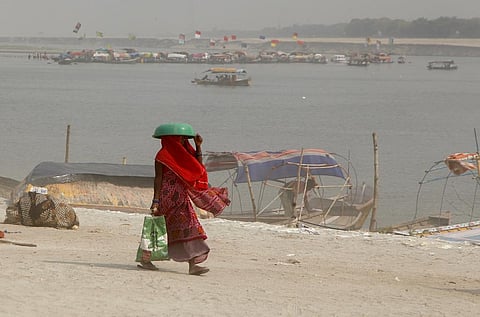

A new survey conducted across India paints a clear picture of the country’s growing concern over climate change. According to the nationally representative poll, carried out in September-October 2023, a staggering 91 per cent of respondents believe global warming is real and happening right now.
The level of worry is equally significant, with 59 per cent of those surveyed expressing “very worried” sentiments about the issue. This indicates a heightened sense of urgency among the Indian public regarding the potential consequences of a warming planet.
Many people in India (52 per cent) believe that if global warming occurs, it is primarily caused by human activities, while 38 per cent believe it is primarily caused by natural environmental changes. Few said there was another cause (1 per cent), that there was no cause because it was not happening (2 per cent) or that they did not know.
The report, Climate Change in the Indian Mind, 2023, was based on a third nationally representative survey conducted by the Yale Program on Climate Change Communication and Indian international polling agency Centre for Voting Opinion & Trends in Election Research, also called CVoter. The report aimed to know about the current public climate change awareness, beliefs, attitudes, policy support, behaviour, and self-reported vulnerability to extreme weather events.
When it comes to global warming risk perceptions, a large majority believe it will harm flora and fauna (83 per cent), people in India (82 per cent), future generations (81 per cent), people in their own community (78 per cent), and themselves and their own family (74 per cent).
Approximately 53 per cent of Indians believe they are already being affected by global warming. Approximately one-third of Indians (34 per cent) have already relocated or are considering doing so due to weather-related disasters such as extreme heat, droughts, sea-level rise, flooding, or others.
When it comes to the impact of global warming on natural disasters, the majority believe that it will cause "many more" severe heat waves (60 per cent), extinctions of plant and animal species (57 per cent), droughts and water shortages (56 per cent), severe cyclones (54 per cent), famines and food shortages (50 per cent), and severe floods (46 per cent).
When asked about the impact of global warming on weather and monsoons, 71 per cent of respondents said it affected their local weather and 76 per cent said it affected monsoons in India “a lot” or “some”. Few people (5 per cent) said that global warming has no effect on their local weather or the monsoons in India.
When asked about the importance of global warming to them personally, 92 per cent said it was “extremely” (38 per cent), “very” (35 per cent), or “somewhat” (20 per cent).
The survey also demonstrated the public’s willingness to take action to combat global warming. When asked if they are willing to make significant changes in their daily lives to protect the environment, the vast majority of Indians (79 per cent) said they are either “already doing this” (25 per cent) or are “definitely” willing to do so (54 per cent).
The Indian government should be doing more to address global warming, according to 78 per cent of Indians. Only 10 per cent believe the government is doing enough to combat global warming, while 9 per cent believe the government should do “less” (5 per cent) or “much less” (4 per cent) to address the issue.
A large number of people in India supported policies to address environmental issues. Around 86 per cent supported the Indian government’s commitment to achieve the Net Zero emissions target by 2070, as announced by Prime Minister Narendra Modi in India’s Panchamrit Declaration at 26th Conference of Parties to the United Nations Framework Convention on Climate Change, held in Glasgow, United Kingdom.